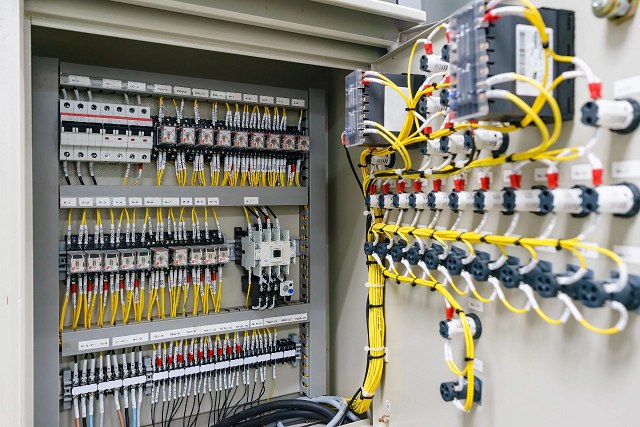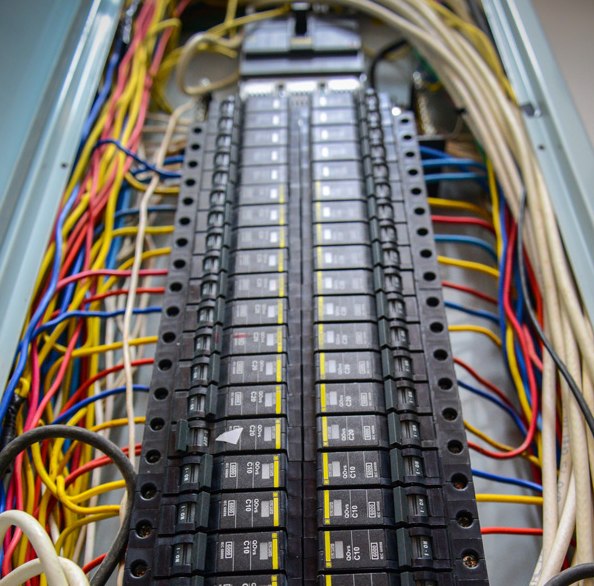As the demand for household electricity is increasing day-by-day, usage of proper Electrical Panels is more important than ever. Even though electrical panels last for a long time, we should check them every now and then for any failures so that we can avoid electrical fires. If you find any faults in the electrical panel such as burns, rust, etc., then you should definitely consider for an Electrical Panel Upgrade for a safe and accident-free home.
Outline
ToggleWhat is an Electrical Panel?
The electrical panel can be considered as the heart of your household electrical wiring system. It is also called using other names such as Circuit Panel, Circuit Breaker Panel, Distribution Box, Fuse Box or Panel.
As most modern electrical panels consist of circuit breakers rather than fuses, the name Fuse Box may not be entirely accurate but it is struck as older homes have fuses instead of much safer circuit breakers.
Irrespective of the name, an electrical panel is a large metal box which consists of an array of circuit breakers that protect respective circuits from overloads. It is recessed into the wall and is usually found near utility area or garage or an exterior wall or the basement, right next to the electric meter.
It acts as the main “distribution” point for the entire home’s electricity. The two hot wires from your utility company are received by the electrical panel. From the panel, the electricity is distributed to different circuits of the home using respective circuit breakers.
Depending on wiring implemented in your home, all the lights might be connected to one circuit or an individual room might be connected as a single circuit, or all outlets in your kitchen might be connected to a single circuit.
Some common circuit breaker sizes are:
- 15-Amp Breakers
- 20-Amp Breakers
- 40-Amp Breakers
- 50-Amp Breakers
- 60-Amp Breakers
- 100-Amp Breakers
- 200-Amp Breakers
Of these, the 15-Amp and the 20-Amp breakers are the most commonly used ones in residential electrical panels, while the 200-Amp breaker is used as the main circuit breaker.
You can switch off individual circuits by toggling the circuit breaker at the electrical panel. This is very important if you are making any electrical repair or installing a new appliance. The electrical panel also houses the main disconnect switch or the main circuit breaker to shut off power to all the circuits.
Picking the right panel is important whether you are upgrading your old electrical panel or buying a new panel for a new home. Most modern homes can be designed using a 200-Amp system with 30 – 40 circuits. But if you have a larger home, then you can opt for a 60 circuit 300-Amp system or 80 circuit 400-Amp system.
What is an Electrical Panel Upgrade?
Regular inspection and maintenance of the electrical panel is necessary and you should check for burn marks, rust and scorching. If you find any abnormalities or faults in your electrical panel, then it is time to upgrade it.
The process of upgrading an Electrical Panel involves checking for existing wiring, breakers or fuses in your panel and replacing them with a better and upgraded options. During the process, you can also check for receptacles and switches and add additional circuits in your home to reduce the load on existing circuits.
Signs Indicating an Electrical Panel Upgrade
If your home is 25years or older, then it probably has an outdated wiring and electrical panel to keep up with the current electricity demands. Even though a typical electrical panel lasts for more than 25years, the increased utilization of electrical appliances and gadgets might make your panel insufficient and you have to upgrade it with a better option.
Another reason to upgrade is if your panel still has fuses instead of circuit breakers. Fuses are yester generations’ system and are not as safe as circuit breakers. Fuse based electrical panels might not get the same support as circuit breaker options from the insurance companies, in case of an unfortunate event.
Rust is a common problem with metals and if rust builds up in the electrical panel or circuit breakers, then it might damage the connections, which could further lead to increase in temperature and fire. If you see burn marks or smell burning plastic, then you have to immediately upgrade your panel and avoid fires.
Some Other Signs that Indicate an Electrical Panel Upgrade are:
- Electrical Shocks: If your receptacle gives you mild shocks when you insert something or toggle the switch, then the wiring behind the receptacle or switch might be defective or installed incorrectly.
- Burning Smell or Sparks: If the outlets look burned out or starts deteriorating in color, it might be a sign of faulty wiring or circuit. Burning Smell usually means you are overloading the circuit and wire is overheating.
- Lights Flicker and Dim: If you turn on a heavy electrical appliance such as an oven or electrical heater and notice that lights dim for a moment, then it usually indicates that the wiring is not designed to handle the load and you are overloading the circuit.
- Circuit Breakers trip frequently: If your circuit breaker trips frequently, then it is an indication that the circuit is overloaded or old and couldn’t handle the demand.
- Home Remodeling: Remodeling and upgrading your home usually means you are expanding it and since it involves adding new circuits, you might as well take a look at the old system and see if it needs any upgrades.
- Installing a New Appliance: When you are installing a new and powerful electrical appliance, you definitely have to install a dedicated circuit to that appliance, which might usually be a 240V circuit.
- Do not Rely on Power Strips and Extension Cords: If you feel that existing outlets are not sufficient to plug-in all your gadgets and device and you use power strips and extension cords, then it is high time you stop that. Power strips and extension cords are a sever fire hazard and instead of using them, you could invest in upgrading your panel with additional circuits and outlets.
The Process of Upgrading an Electrical Panel
One of the main reasons of fires in homes in the U.S. is due to electricity. Upgrading your electrical panel and wiring will definitely make life easier and helps in avoiding unfortunate accidents.
That said, we highly recommend you not to take up electrical jobs such as upgrading electrical panel and re-wiring your house as DIY projects. Working with electrical panels, circuit breakers, wiring and outlets involves dealing with mains AC, which is lethal.
You should have the technical knowledge and expertise to perform such jobs. Also, different states have different sets of rules, regulations and permits that you must adhere to.
Hence, you should definitely consult with a licensed electrician, if you are planning to upgrade your electrical panel or wiring. They will coordinate with the utility company, get all the permits from authorities for a proper and inspection ready installation.
A Typical Electrical Panel Upgrade Process
- First, you contact a licensed electrician and explain to him / her about your requirements.
- He / She will explain the upgrade options and also provides you with an estimate of the overall job.
- If you green light the project, the electrician will start the work by first obtaining all the permissions and permits to do the job from your utility company.
- The utility company will disconnect the power to your home. If your electrician has the permission to do this, then they can disconnect as well.
- Now begins the actual work. The electrician, along with his / her team, will start the upgrade process, installation of new wiring, replacing / adding receptacles etc.
- Depending on the type of project, it might require an inspection from an inspector.
- If everything looks fine, the inspector okays the project and your utility company will reinstate the power.
This is just an overview of the upgrade process and the actual process varies from one job to other. Also, the time required to complete the upgradation will vary from hours to days, depending on the complexity of the project.
How Much Does it Cost to Upgrade Electrical Panel?
The cost of upgrading an electrical panel will vary from project to project. If you want to completely re-wire you home and replace old fuses with circuit breakers, then the cost would be significantly high.
But if the existing wiring is fine and you want to expand the panel with a new circuit or add a dedicated circuit for a new appliance, then the cost would be less.
The cost also depends on where you live as each state has different rules and regulation, requirements and taxes.
Conclusion
Electrical Panel is an important part of a modern home’s electrical system. It receives the power from utility and distributes it all over the house. Hence, frequent inspection and maintenance will help in avoiding fires and other accidents.
If you find any faults or irregularities or if you have an old electrical system, then we recommend you to get it checked immediately and possibly opt for an electrical panel upgrade. If you are planning to upgrade your electrical panel, then you should definitely consult with a licensed electrician.




One Response
Thanks so much..